‘Zhirinovsky received a demand to pay off debt and now advocates the prohibition of collection activities’
Transcript of the II Annual Business Forum ‘Debts of small businesses.’ Part 2
The first part of the forum of Realnoe Vremya was about the availability of loan funds, the second – their repayment. As an example of different approaches by the authorities, the participants of the forum recalled the high-profile case about a fire in the Admiral shopping centre, Kurmanov Junior, defrauded investors of equity construction. The businesses view the activities of collectors and 'bandit front' not in a good light. However, these representatives of debt 'business' also found their defenders: first ones — in the person of a forum moderator Jan Art, the latter — in the person of an attorney Emil Gataullin. Besides, the forum suddenly became a platform for revelations of entrepreneurs.
'Debt collection is also quite an ancient profession'
Irek Galyamov (a question from the audience): Will the fact that now collectors are being 'pressed' impact negatively on the banking business?
Yan Art, Vice-President of Association of regional banks of Russia, a moderator: No. Look, in Russia people started discussing seriously the collection of debts due to the crazy and provocative antics, which, first of all, were shown on TV, only after the prohibition of the institute of debt collection. How will it affect? Don't expect a rate cut after that, it will be 50%, because the risks will grow.
Generally, debt collection… They say that the first ancient profession is prostitution, the second is journalism, it seems to me that debt collection is also quite an ancient profession, and only some of our politicians with a special turn of mind can offer to cancel it, including the leader of a very cute, naughty party, who recently has received from one of our collection agencies a requirement to pay off debt, after which he started advocating the prohibition of collection activities – Vladimir Volfovich Zhirinovsky. It turned out he received a demand to pay off debt from one of the collection agencies. He has a debt to Rosttelekom – perhaps, he had not paid telephone bills. Populists say that it is necessary to prohibit the collection. Those in this room who have debts — would agree, those who don't — would say 'Let's think about it'.
'Sorry, but the law, which somehow would state the principles of shariah, won't be in the Russian Federation'
Rinat Gabbasov, the director of the Russian Center for Islamic Economy and Finance, Islamic Business School (a question from the audience): First of all, I have a question to Dilyus Rasimovich and to Sergey Georgyevich. We travel around the regions, communicate with the businesses, conduct the Islamic business school. We express the basic principles of Islamic business – they are the principles of participation, principles of risk sharing, i.e., if it's a profit, they share a profit, if a loss, they share a loss. Is the state economy ready to create a direction, where especially industry and agriculture enterprises would receive a credit line with risk sharing? Because in any case 10%, 11% — it is fixed rate. Fixed rate means nothing, because the real business, the real economy has nothing to do with a fixed rate. Fixed rate just anticipates what is possible but does not mean in fact the division of specific profits.
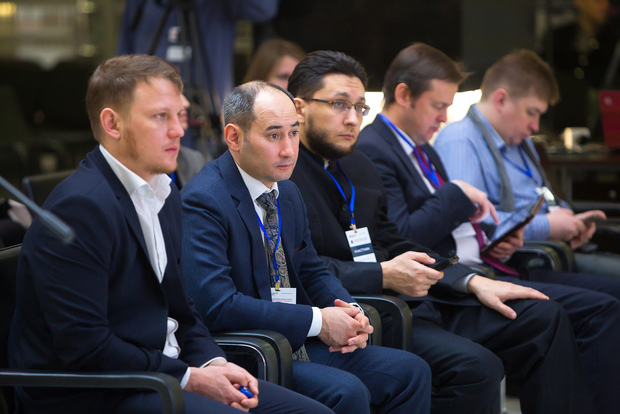
Rinat Gabbasov (in the centre): The basic principles of Islamic business – they are the principles of participation, principles of risk sharing, i.e., if it's a profit, they share a profit, if a loss, they share a loss'
Is the government of the Republic of Tatarstan ready to work, to allocate lines of loans, especially for small businesses? My opinion: if we start this… And there is a very good precedent, for example, neighbouring Republic of Kazakhstan. In Northern Kazakhstan a few years ago they tried an interesting experience, when farmers, mostly even non-Muslims, Russian farmers were offered loan lines according to the principles of musharaka. The demand was fully realized. Give us more opportunity so that we shared profits and losses. What is the Republic of Tatarstan today? A pilot region. It was stated that this is a pilot region in which the principles of Islamic banking and finance are being implemented.
Dilyus Shavaliev, the head of the Center for business support of RT: I think that this tool first should work out, and only then we'll share the risks of various banks, because today there is no such tool.
Gabbasov: Let's create. I propose to create a tool for a fair economy.
Art: If Mr. Shavaliev today supports it somehow, he will break laws. He is not against this tool, he just has no right to.
Shavaliev: There are no banks that give such loans, respectively, the state has no one to work with.
Gabbasov: In the framework of the pilot region, as I understand, free economic zones are possible, economic easing. If it is a pilot region, not only special laws are possible but also special economic privileges, like Vnesheconombank, for example. It is clear that the Bank is faced with a very difficult time, but as you know, Vnesheconombank works according to not quite conventional principles, which are used by the other banks. In the framework of those power that is given to Vnesheconombank, if the same power will be given to the Republic of Tatarstan, why not?
Lyudmila Kitaytseva, a chairperson of the Board of the Banking Association of Tatarstan: I would like to add, as I have studied this subject: Islamic banking does not involve the loans issuance in general. Right?
Gabbasov: Yes, right.
Kitaytseva: I don't understand how the Guarantee Fund or state support, subsidizing of interest rates can help.
Art: The Guarantee Fund can't help here. It turns out that if it is profit, we'll share it, but if…
Kitaytseva: We still don't have laws, so today, I think, it is premature to ask such questions to the government. In other countries – the other legislation, other regulations for banking. We have a completely different thing.
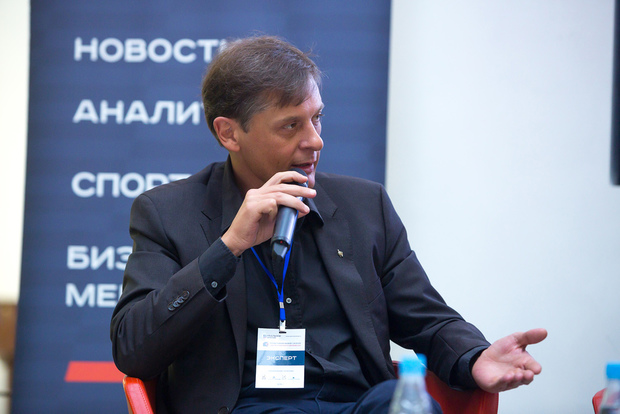
Yan Art: 'Our Association has a working group on the topic of Islamic banking. The tool is interesting, it can be interesting in regions with a significant part of Islamic influence.'
Art: Our Association has a working group on the topic of Islamic banking. The tool is interesting, it can be interesting in regions with a significant part of Islamic influence. Why not? There are two points. The first is an attempt to push the law about Islamic banking. The likelihood that Russia will adopt such law is extremely small. In particular, the federal service that regulates something has joined the work of our group. The specialists of this service said, sorry, but the law, which somehow would state the principles of shariah, won't be in the Russian Federation. As a Russian citizen, I totally support this.
Gabbasov: To state the principles of sharia, of course…
Art: I told it just for reference. The second point — only one Russian bank – Forte Bank, which worked on the principles of Islamic banking, lost its license. And this is the case when the reason was not a violation of regulations or a lack of reserves, but a specific funding, a criminal case, it imposes a very dubious shadow on the subject. Although again, the tool itself is a rather curious thing and in a Muslim environment will be in demand. The problem is in the regulatory basis — the assets, the liabilities, what is it? Do they have to have reserves? On what basis?
Gabbasov: In the neighboring Republics of Kazakhstan, Kyrgyzstan, which have very complex legislation, successfully adopted the law on Islamic finance.
Art: We are not Kyrgyzstan yet.
Gabbasov: It is difficult, but we can draft a bill on a partnership economy, a fair economy, anything that would reflect these principles. No matter how to call it. The main thing is to work on fair principles, and not on usurious that kill the business.
Art: Jewish you mean?
Gabbasov: No, I would say…
Art: Let's call a spade a spade. But, sorry, he has won, he dominates. Why the Saudis, perhaps orthodox believers feel free to own 10% of the City Group, which uses a mean Jewish interest?
Azat Murtazin, Director General of KASKO Service (a question from the audience): I want to say that the state programme presupposes the subsidy of interest rate. Islamic banking has no interest rate. Then, what are we talking about?
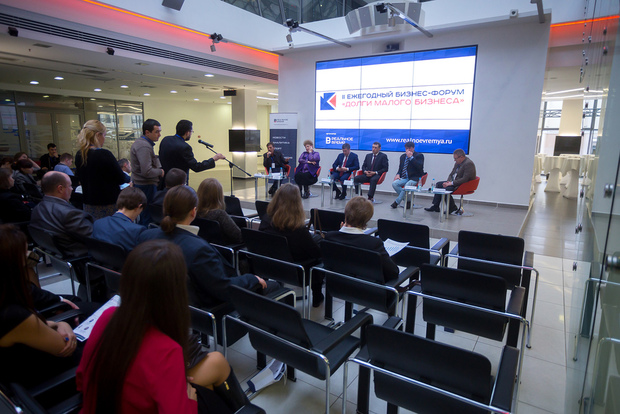
Rinat Gabbasov: 'Islam has the equitable principle, when a bank issues a loan only for viable projects, because it will bear the risk of loss if the project doesn't work'
Gabbasov: The guarantee of investments. That is, there is a guarantee of investing with whom? With an entrepreneur. At the same time, it carries risks. Of course, a bank when gives a loan does not look at the business plan. A bank gives a loan under a mad rate because it always can take away the collateral. That way the Russian banks work. Islam has the equitable principle, when a bank issues a loan only for viable projects because it will bear the risk of loss if the project doesn't work. We can create an investment platform that would attract and reimbursed funds in the framework of a pilot project on the territory of the Republic of Tatarstan, i.e. the project financing on the principles that I have mentioned.
Art: Tatarstan is not a pilot project, it is a region, people live here. A bank can be a pilot project. If there is no bank – there is no one to work with.
Gabbasov: For some reason in the UK it works normally…
'In Tatarstan, large businesses are just represented very strongly'
Art: You gave an example properly – they have packed everything there reasonably. We can trace, but the process should be devoid of religious overtones.
If you look at the latest statistics of the Central Bank on the situation with lendings, from the point of view of development, in general, Tatarstan looks as a very powerful region — 811 billion rubles of loans have been issued to businesses. And it is a very good figure. For example, in Bashkiria it is twofold less, in other words, Tatarstan is leading. But what is 'annoying' — is the percentage of SMEs in Tatarstan – one of the smallest in Russia. In Bashkiria for example, 400 billion rubles have been issued, about 100 billion rubles – to small businesses, in Tatarstan 800 billion rubles have been issued, and 170 billion rubles – to small businesses. What does it depend on, how do you think? Is it a problem, is there a danger zone that small and medium businesses in Tatarstan is a stepson?
Shavaliev: In Tatarstan, large businesses are just very strongly represented (Tatneft, TAIF Group and Kazanorgsintez), they create large investment projects and attract new resources for some specific projects. So, we believe that the level of loans for SMEs, in principle, is stable and approximately at the same level. Even when we say that it is necessary to increase the share of small and medium businesses in GRP, I think it is not quite correct, because a mean with which it is possible to increase the share of SMEs – you can just 'ruin' large business.
Kitaytseva: I want to add that in the course of analyzing of financial figures, the share of SMEs remains 18-20%, but at the beginning it was 8-9%.
'It is better not to deal with banks, and the thing is not that they have highly-skilled lawyers…'
Remark from the audience: I would like to make a small remark: I would like to pay attention that the Ministry of Economy represented by Mr. Shavaliev does a lot in Tatarstan to support the businesses, but entrepreneurs are not active. I would like to formulate the question: what mechanisms do small businesses have in order to build parity relations with large businesses?
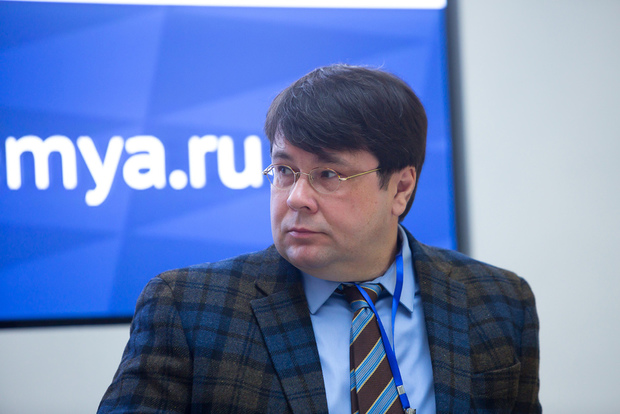
Emil Gataullin: 'It is better not deal with banks, and the thing is not that they have highly-skilled lawyers – they have ordinary lawyers, the thing is that the entire law enforcement system is built that way.'
Emil Gataullin, an attorney: Actually, I do not see such mechanisms. This mechanism tried to emerge with the emerge of the judicial remark of the Supreme arbitration court, which tried to introduce into a legal reality the concept of strong and weak parties. It was a case of the dispute with the bank, a term was not designated in the loan agreement. The presidium pronounced judgement in favor of the borrower and indicated that the borrower is a weak party towards the bank, because the bank is professional, it has long been engaged in this business, it is possible to develop an appropriate service. And, accordingly, as a strong party it has to bear the consequences of the fact that one or another term is ambiguous, unspecified. But this position has not received further development, but it could get development in the current judicial practice.
But I can say that it is better not to deal with banks, and the thing is not that they have highly-skilled lawyers – they have ordinary lawyers, the thing is that the entire law enforcement system is built that way. I don't know why it is like that, but the legislation states that any entity that intends to start bankruptcy of one or another entity must have the court decision, which entered into force with a certain amount of penalty, and only then it has the right to go to court and start the procedure of bankruptcy. Loan institution is free from this – it does not need to obtain a court decision, and that fact confirms that the government is inclined to give more freedom and biased in favor of a bank.
Iya Kulikova, an entrepreneur (a remark from the audience): To banks, generally, we have no major complaints, and the trading prices and rent break the balance and interests of the parties substantially.
Gataullin: As a rule, it is big players, these big shopping centres have a 'short arm' for connection with power resource.
Kulikova: Park House?
Gataullin: I don't know the business of Park House, who controls it, who is the real beneficiary of the business.
Kulikova: Nobody knows. The director – a Turkish citizen.
Art: But it's also free market. The mechanism of equalizing of rights, it was always called 'six-digit colt'. There is even a saying: God created people different, but the colt equalized. The same thing is with business, but to equate at the level if to 'bend' a director of Park House and to say: 'Well, give away,' – it is also not a constitutional decision from the point of view of relations.
Almaz Ziyatdinov (a question from the audience): Good afternoon, dear guests. My name is Almaz Ziyatdinov, I am the head of the Balance company. I would like to thank you today for the wonderful guests. What is an entrepreneurship? It's a risk, they should seek not only support from the state. An entrepreneur is a person who always looks for opportunities. Here, you've talked about Park House. I have friends-entrepreneurs that occupy places in the Park House, I also occupied place in Park House, when I started, understood nothing in business. You need to consult with senior colleagues, to surf the Internet – don't be lazy, because the competition in this market is huge. Traffic is large, so they set certain access limits to these shopping complexes.
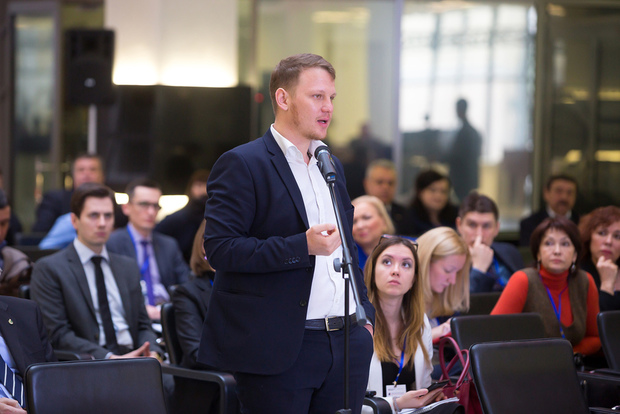
Almaz Ziyatdinov: 'A bigger problem of small businesses is the lack of well-formed business processes, a lack of understanding of financial disciplines, a lack of financial literacy.'
About possibilities, I want to say again that an entrepreneur is, first of all, a person who seeks possibilities, and does find them, so there is no need to say: there is a problem – they don't give loans. A bigger problem of small businesses is the lack of well-formed business processes, a lack of understanding of financial disciplines, a lack of financial literacy, incorrectly built company business processes – this is the main problem for small businesses.
Now I 'pull out' some problem enterprises, I wouldn't say that large enterprises – the guys with debts at 20-30 million rubles. The problem is not only in loans, problems are in the human minds. For example, some illusions are being created: wrong use of finances, bought a car, took other bigger loans, personal loans to cover debts of the business. What does this mean? This means that a person is financially illiterate. Therefore, such recommendation: everyone needs study financial literacy, and, thank God, there are already different tools in Tatarstan.
I wish all of you success, to move, move, i.e. now is a moment of new possibilities, you can rebuild quickly. Some say they have problems, and there are entrepreneurs who say: 'We wish the state does not interfere, everything is fine, the main thing — let it be not worse.' Now we have such projects as 'Business-molodost', 'Factory of Entrepreneurship' (very strong project).
Art: Thank you. You have brought us to the theme of the insolvent ones in the business environment and the related problems.
Gataullin: The main problem that I see is that the institute of a legal entity doesn't work very consistently in our legal system. What are the purposes of a legal entity in the commercial relationships? In order to secure their personal property, if something happens a legal person would responsible for collateral, in order not to take personal assets from a citizen. I see that there is an inconsistent approach to the fact that in some situations the state doesn't see a legal person and begins to see those beneficiaries who are behind this entity, and begins to make claims related to the debts of this legal entity, to specific individuals. This is manifested in the examples of two recent cases – none of them closed.
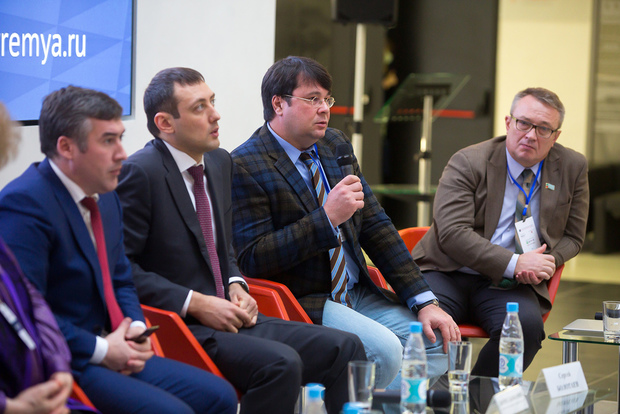
Emil Gataullin: 'In my opinion, as part of the process of debts collecting it is the issue of uncertainty that you adequately have protected your personal property by establishing a legal entity, it is an urgent issue.'
<…> In my opinion, as part of the process of debts collecting it is the issue of uncertainty that you adequately have protected your personal property by establishing a legal entity, it is an urgent issue.
'The case of FON, its Director General: now by means of criminal cases they put pressure on business owners'
Andrey Tatyanchikov, a participant of the project 'Kamsko-Ustinsky plant of gypsum plaster': Both speakers are right, and I'm not even going to argue, I will give an example from my own experience: I went through bankruptcy, I was the head of the company that was bankrupted for various reasons. More specifically, first, the bank created a situation in which I was forced, not wishing to quarrel with the bank, to offer all other assets of the enterprise to the bank, in order it wouldn't withdraw the loan before the deadline, i.e., gave additional security. But then the political moment intervened: it was the early 2000s and late 1990s, I maybe made some political errors, they were interesting, and a little pressure appeared from official parties, i.e. 'no easing for him'.
I realized the complexity of the situation, when, inter alia, the head bailiff came and said: 'Well, what are you going to do in our village? Get out of here'. I was the owner, the Director General of a dairy plant. I said a little bit roughly, but it was different, everything was polite. It's not the collectors, not some 'criminals' – all was civilized. I made a deal with the bank, and when it went through, I realized who is the actual beneficiary, because after a while, in fact, I went through bankruptcy. The bank took all the assets. Then some people bought, and my enterprise was a part of a larger company. It was soft, but a raider takeover. But, fortunately, I kept my own property, but it was the early 2000s, the situation was much milder than today.
Today, banks do not issue large loans, if you do not provide personal property as a collateral for own business. I have such collateral. This is a very inconvenient form, but in essence, it implies in case of failure, in case of bankruptcy, non-repayment the liable with your personal property. I.e. pressure on the borrower in this case is much stronger. Today the situation is this.
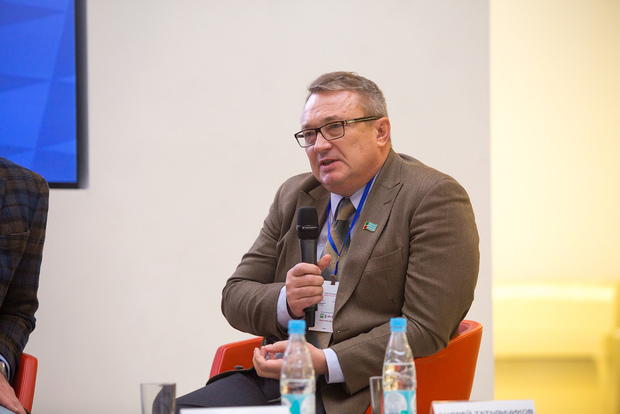
Andrey Tatyanchikov: 'I call for more responsibility: when you take loan, you have to understand, we must soberly assess your resources and capabilities. If you can't handle, we should look for other possibilities, you should go and discuss it with the banks.'
What Gataullin has told about two examples, I would like to expand this line. This line is quite large, if not the bench. Now – it is the case of FON, its Director General: now by means of criminal cases they put pressure on business owners so that they, so to say, opened 'bins' and got from there some hidden assets, and in order to solve the problem with investors of equity construction who haven't get housing. The same thing is with Sveya, Mag-Story company. And, you know, there are legal mechanisms, they were given a legitimate form. As for the housing construction, for example, I also have an apartment in Mag-Story company – and we can't get the apartment for two years, i.e. I realize that it would be nice to 'knock out' some assets.
As for small businesses, then the bailiffs work well – there are tools and mechanisms. I call for more responsibility: when you take a loan, you have to understand, we must soberly assess your resources and capabilities. If you can't handle, we should look for other possibilities, you should go and discuss it with the banks. <…> Today, except the specific behavior of some collectors, crime management institute has been eliminated, which used to do this. And it is good.
'A person who once was a member of organized crime, who all in tattoos, he would be a very efficient collector'
Gataullin: I would like to make an important remark to clarify my position: I do not criticize one approach or another. It lies in the fact that two approaches cannot coexist. I.e. you say that there is no legal entity as a mean to secure their personal property, it just does not exist, then eliminate it – what's the problem? It is a quite possible outcome.
I also became interested by mentioned 'criminals' of other things, you know, we have a number of topics that we cannot discuss due to biases to that 'criminals', when there are lawyers it is unforgivable to say such things. But in order to understand how the organized crime exists, in what it has evolved in the developed countries, this issue needs to be studied. In my opinion, a person who once was a member of organized crime, who all with tattoos, if he comes to a debtor and do it politely without swearing, as they usually do it – then the debtor will give him the money. I think he would be a very efficient collector.
Then, I believe that organized crime played a significant role in the formation of the trade union movement. I don't see that we have normal, independent trade unions that will defend the rights of those or other workers. Abroad, the trade union movement is governed by a specific mafia. It helped to protect and implement the rights of workers and to enact appropriate legislation that allowed protect in this mutual struggle between employer and employee the rights of the employees.
I want to say that even the most negative phenomena – whether of corruption or organized crime — inevitably have both negative and positive aspects, and any positive one can have negative consequences.

Yan Art: 'The provincial collection business – it is a call center. Can you understannd, they do need the appearance. Moreover, a woman with the sexy voice achieves a larger debt repayment, according to statistics, than a man with a gruff voice. The situation with collection business is very painful.'
Art: As for the attacks on the collectors, then I would say that people in the presence of a criminal record are prohibited to the collectors by internal regulations. So we don't know, whether such collector is effective or not. It is first. Second, more unpleasant: in our Association – 29 agencies, officially none of them works with small and medium businesses. No one at all. All of them are focused on the debts of natural persons to the banks. The question: who comes to you? Are you sure they are collectors?
Gataullin: I think you need to sign a contract with Mosfilm or any other film company where there are make-up artists, to invite artists with a provincial appearance and send them as representatives of collection agencies.
Art: That is just it, the provincial collection business – it is a call center. Can you understand, they do need the appearance. Moreover, a woman with the sexy voice achieves a larger debt repayment, according to statistics, than a man with a gruff voice. The situation with collection business is very painful.
Two minutes of positive
Kitaitseva: You can criticize the banks. The fact that the banks increased interest rate in 2014, outraged everyone, but the fact that banks have also raised the rate on deposits, everyone forgot. And, despite such life conditions of the banks, I want to say that the banking sector in Tatarstan is considered as one of the best in Russia — three largest banks of Russia (out of 24 banks: 19 – in Moscow, 1 — in Samara, 1 – Khanty-Mansiysk Bank). It tells about the financial stability of our banking financial system. Then I would like to say that our city administration has a programme to support small and medium businesses, and if a businessperson applies there with his programme that is interesting for our city, they are ready to provide the municipal assets and loans, which amount increases two-threefold. They have such programme with Bank of Kazan. And that week I also heard about an interesting programme. I think that if in Russia there were about 10-20 persons, like our President Minnikhanov, we would have already been ahead of the rest. We do not destruct, we create.
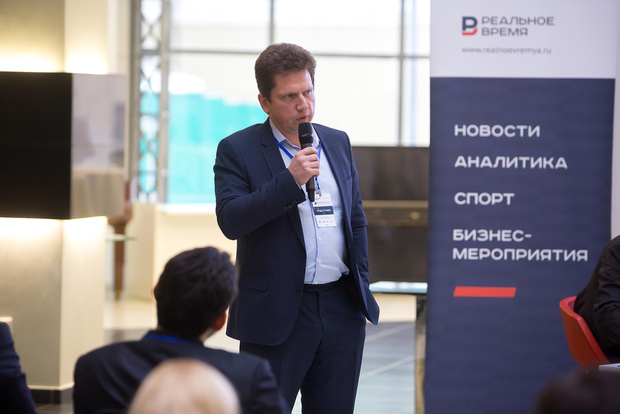
Oleg Makovsky: 'All should be based on trust, hard and honest work of entrepreneurs who become victims of circumstances and of many factors, entrepreneurs are the weak party. They just need do their job and get a small reward. Thank you.'
Art: Thank you, positive and specific speech. Colleagues, we have received questions through Realnoe Vremya online newspaper. But before I would like to take two minutes of your time, because SMEs are people and, first of all, the relationships that are based on people's work, on creativity. And I am very pleased to present the award to one of the small enterprises of Tatarstan from our Association. The company is, as far as I know, operating Tatarstan small business for the past 10 years. Very good work, so with honorable diploma of the Association in honor of the 25th anniversary, PLC Kazan publishing house named after Makovsky is awarded. Please come, I am very pleased to congratulate.
Oleg Makovsky: Thank you very much, I'm very pleased. I would like to note that today's topic is especially interesting, but all should be based on trust, hard and honest work of entrepreneurs who become victims of circumstances and of many factors, entrepreneurs are the weak party. They just need to do their job and get a small reward. Thank you.